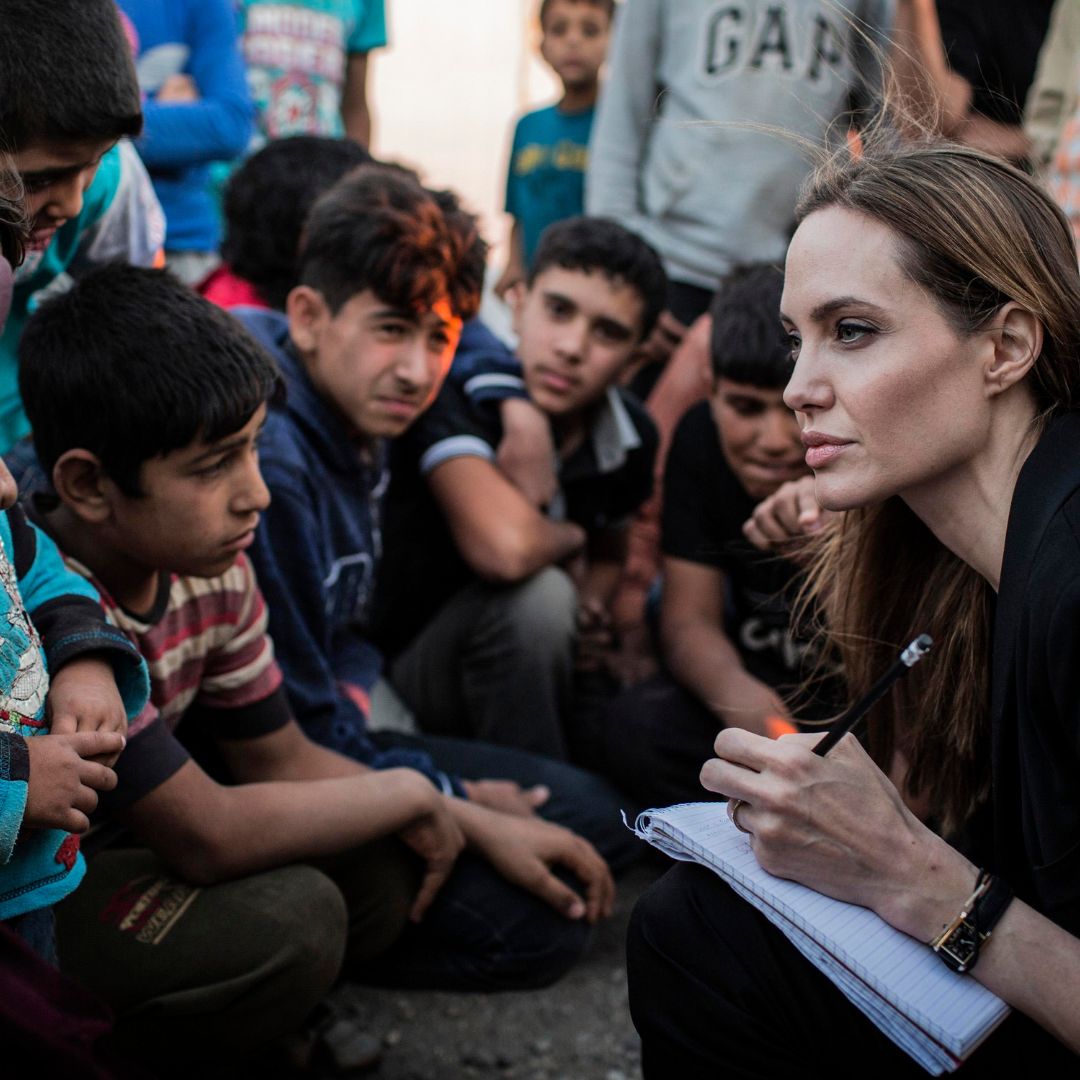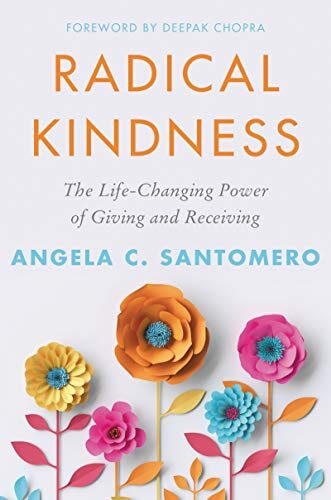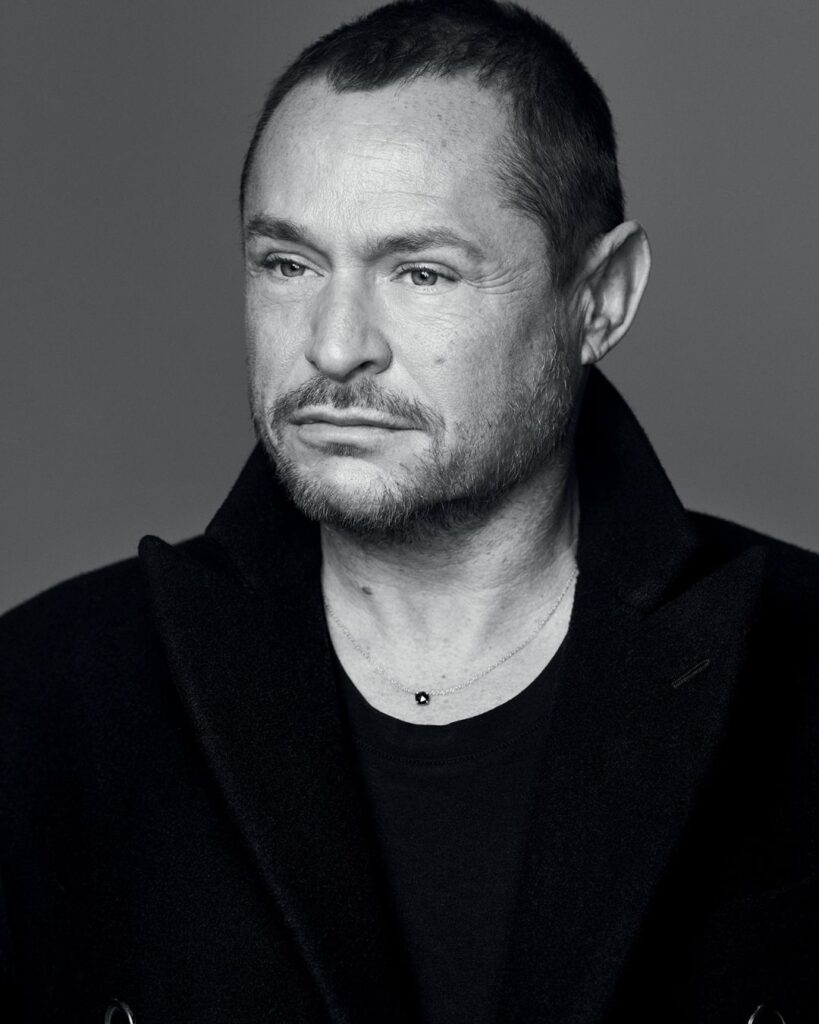Studies suggest that kindness has transformative powers—it, in fact, acts as a natural painkiller.
- Culture & Travel
Can Radical Acts of Kindness Make Us Better, Happier People?
- ByMeghna Sharma

Actor and UNHCR Special Envoy Angelina Jolie with Syrian refugees
Image courtesy: unrefugees.org
The world, right now, is in shambles. Looming climate catastrophes, multiple wars, and the constant fear of an uncertain future after battling an unforeseen pandemic have left many of us with a pessimistic attitude. And the barrage of distressing news popping up on our mobile screens every day doesn’t help either.
We all have an empath inside us, and observing the pain and misery children, women, and mankind in general are going through does take its toll on us. But ever so often, a piece of news about people helping each other out in distressing situations, or even a video of an apex predator coming to another animal’s rescue brings a smile to our face and restores our faith in the power of kindness.

Let’s Talk About the Concept of Kindness
Angela C. Santomero, creator, executive producer, and head writer of popular educational children’s shows wrote a book on the subject. In Radical Kindness: The Life-changing Power of Giving and Receiving, Angela explores how kindness can change your life. She insists that, much like gratitude, we need to make kindness a practice—toward ourselves, our loved ones, and the world at large.
In its various forms, kindness holds the power to transform lives and uplift spirits. And there are two distinct approaches to expressing kindness: random acts of kindness and radical acts of kindness. While both share the common goal of spreading goodwill, they differ significantly in intention and its subsequent impact.
Random acts of kindness can be defined as spontaneous, unpremeditated gestures of goodwill. They often involve simple actions, such as complimenting a stranger, paying for someone’s coffee, holding the door open, or randomly giving someone a gift, among others. The intent behind random acts of kindness is usually to brighten someone’s day, and it may not extend beyond that particular interaction.
However, radical acts of kindness are intentional and purposeful—they go beyond isolated gestures. They involve a conscious decision to approach life with compassion, empathy, and a commitment to making a positive impact on people and communities. One must make a conscious effort to understand and appreciate others’ perspectives, and respond with genuine compassion—fostering a culture of acceptance and understanding.
Empathy and Kindness Are Intertwined
One of the cornerstones of radical kindness is the cultivation of empathy. By putting ourselves in the shoes of others, we gain a deeper understanding of their experiences, challenges, and emotions. This allows us to connect with people on a deeper level.
In a paper published on the neuroscience of empathy in the Association for Psychological Science, Dr Christian Keysers of the Netherlands Institute for Neuroscience in Amsterdam, notes, “When we witness what happens to others, we don’t just activate the visual cortex like we thought some decades ago. We also activate our own actions as if we’d be acting in similar ways…we activate our own emotions and sensations as if we felt the same.”
Dr Christian’s work concludes that observing another person’s pain or action triggers parts of the same neural networks responsible for executing those actions and experiencing those feelings firsthand—it operates like a mirror system.

Okay, So How Can One Be Kinder?
Actor Angelina Jolie once revealed in an interview that she was struck by a little girl’s kindness while visiting the Syrian border. “This little girl came up to me and offered me some biscuits that she had in her pocket. Knowing what she’d come from, knowing what she was heading into, knowing everything she’d experienced, yet in that moment she wasn’t thinking of herself or everything she had lost. She wasn’t sitting with self-pity. She just saw me—I must have looked tired and she just walked over and thought to just be kind. That’s what makes human beings so wonderful,” Angeline told People Magazine.
Sadly, the world currently is plagued by many issues. While not all of us have the physical or mental capacity to work on a larger goal, the one thing we can do in our immediate environment is be mindful of people’s beliefs and feelings. Differences in opinion regarding a certain situation, political views, or how we perceive an individual can lead to friction. Radical kindness promotes opening ourselves up to the experiences and emotions of others—this empathetic engagement acts as a catalyst for personal growth, too.
Another way we can be kinder is by actively helping people in need. This could be an individual effort on your part, where you offer assistance or food to people or animals in need; or a community effort, where you can help out a non-profit organisation in your free time. Remember, kindness doesn’t just mean donating money to a cause—while that’s important too—it also means volunteering your time.
Kindness could also be reflected in standing up to bullies or trolls for someone else. Actor, singer, and entrepreneur, Selena Gomez has often set that example—be it raising awareness about mental health issues or urging fans to not spew hate on Hailey Bieber, owing to their alleged feud. Psychologists believe that understanding the struggles and triumphs of others allows us to develop a deeper sense of self-awareness and empathy, leading to a more profound connection with the world.

The Correlation Between Kindness and Mental Well-Being
Consistently practicing radical kindness, people can experience an overall improvement in their mental and emotional states. By embracing kindness as a way of life, we not only contribute to the well-being of others but also experience personal growth and fulfillment. Studies also demonstrate that acts of kindness release oxytocin, the ‘feel-good’ hormone that helps manage and reduce stress and promotes a sense of happiness.
In another six-week study conducted at the University of the South in Sewanee, Tennessee [USA], researchers found that being kind works as a mood booster. Involving nearly 500 participants, Dr Katherine Nelson, lead author of the study, and her colleagues compared how prosocial behaviour—practicing acts of kindness for others or the world—compares to self-oriented behaviour, or doing acts of kindness for yourself. “Our findings suggest that the best way to feel happy is to treat someone else instead. People could feel greater positive emotions, and in turn psychological health, because by being kind to others, they are nurturing social relationships, or they could feel greater pride in themselves for doing a good deed,” Dr Katherine Nelson shares.
Kindness can also be compared to the glue that binds relationships together. Radical kindness in relationships involves active listening, genuine support, and a willingness to compromise. By prioritising the well-being of others, we create an environment of trust and mutual respect. This, in turn, fosters stronger, more meaningful connections with friends, family, and colleagues.
Kindness Creates a Positive Ripple Effect
In a world that often lays emphasis on individual achievement and success, radical kindness emerges as a powerful force for positive change. And the beauty of radical kindness lies in its ability to create a ripple effect. Small acts of kindness have the power to inspire others to follow suit. When people experience genuine kindness, they are more likely to pay it forward, creating a positive chain reaction. That’s why individual acts of radical kindness have transformative potential to help us be better people, and shape a more compassionate world.
To quote the Dalai Lama, “Be kind whenever possible. It is always possible.”





